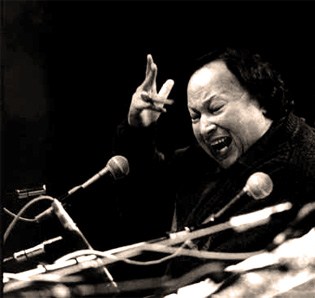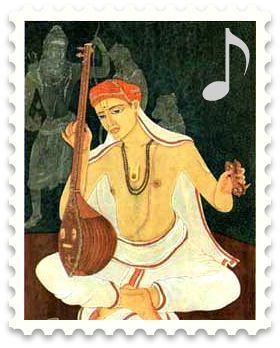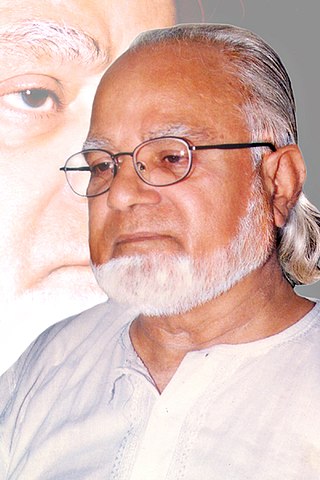
Ustad Nusrat Fateh Ali Khan, also known by his initials NFAK, was a Pakistani singer, songwriter, and music director. He was primarily a singer of qawwali, a form of Sufi devotional music. Often referred to as the "Shahenshah-e-Qawwali", he is considered by The New York Times as the greatest qawwali singer of his generation and as the fourth greatest singer of all time by LA Weekly in 2016. He was known for his vocal abilities and could perform at a high level of intensity for several hours. Khan is widely credited with introducing Qawwali music to international audiences. He was also a master of Hindustani classical music.

Qawwali is a form of Sufi Islamic devotional singing originating in South Asia. Originally performed at Sufi shrines or dargahs throughout South Asia, it is famous throughout Pakistan, India, Bangladesh and Afghanistan and has also gained mainstream popularity and an international audience as of the late 20th century.
Allah Hoo (Allāhu) is a traditional Sufi chant (dhikr) consisting of the word for God run together three times, followed by Truth (haqq): Allāhu Allāhu Allāhu Haqq, itself repeated three times over. According to Sufi tradition, this formula was introduced by Abu Bakr as he initiated the Naqshbandi tradition. Other Dhikrs consist of simple Allāhu Allāhu run together 400 or 600 times.

Rahat Fateh Ali Khan is a Pakistani singer, primarily Qawwali, a form of Sufi devotional music. Khan is one of the most popular and highest paid singers in Pakistan. He is the nephew of Nusrat Fateh Ali Khan, son of Farrukh Fateh Ali Khan and grandson of Qawwali singer Fateh Ali Khan. In addition to Qawwali, he also performs ghazals and other light music. He is also well-known as a playback singer in Hindi cinema and the Pakistan film industry.

Kafi is a classical form of Sufi music in the Punjabi and Sindhi languages that originated from the Punjab and Sindh regions of South Asia. Some well-known Kafi poets are Baba Farid, Bulleh Shah, Shah Hussain, Shah Abdul Latif Bhittai, Sachal Sarmast and Khwaja Ghulam Farid. This poetry style has also lent itself to the Kafi genre of singing, popular throughout South Asia, especially Pakistan, Bangladesh and India. Over the years, both Kafi poetry and its rendition have experienced rapid growth phases as various poets and vocalists added their own influences to the form, creating a rich and varied poetic form, yet through it all it remained centered on the dialogue between the Soul and the Creator, symbolized by the murid (disciple) and his Murshid (Master), and often by lover and his Beloved.
Fateh Ali Khan Jullundhri Qawwal was a classical singer and a qawwali musician in the 1940s and 1950s.

Farrukh Fateh Ali Khan was a Pakistani musician, who played the harmonium in Qawwali music. He was also a member of a well-known family of Qawwali musicians, the Qawwal Bacchon gharana, he was the younger brother of Nusrat Fateh Ali Khan, the son of Fateh Ali Khan, the nephew of Mubarak Ali Khan, and the father of Rahat Fateh Ali Khan.
Badar Miandad Khan, also known as Badar Ali Khan, was a Pakistani qawwali singer. He released several albums in Pakistan. Several albums were also released under UK and Indian labels.
Rizwan-MuazzamQawwali is a Pakistani Qawwali group led by Rizwan and Muazzam, the nephews of Nusrat Fateh Ali Khan. Since 1998, they had stage performances at several World of Music, Arts and Dance Festivals in the United Kingdom and have released multiple albums showcasing their rich musical heritage.
Filmi qawwali is a form of qawwali music found in the Lollywood, Dhallywood, Tollywood, and Bollywood film industries.

Dildar Hussain is a Pakistani percussionist and tabla player. He is known for being the left handed tabla player for late Nusrat Fateh Ali Khan, a renowned Qawwali singer. Dildar Hussain played tabla for him in his qawwali-singing group until Nusrat Fateh Ali Khan died in 1997. Dildar Hussain belongs to the Punjab gharana of tabla-playing music artists. He is a shagird of Ustad Allah Rakha. Dildar Hussain plays the tabla left-handed

Night Song is a collaborative studio album by Pakistani qawwali singer Nusrat Fateh Ali Khan and Canadian ambient musician, guitarist and producer Michael Brook. Recorded in 1995 and released in 1996 on Real World Records, it was Khan's last album released on the label during his lifetime. Khan and Brook had previously collaborated for Mustt Mustt (1990), a critically acclaimed world fusion album said to have led Pakistani youth to discover Sufi religious music. The two had not worked for some time but collaborated again for a new album in 1995, naming the album Night Song. The album was produced by Brook, who developed an innovative but difficult production process for the album. Khan recorded improvisations for the album, and Brook had to decide which sections, some of which were an hour long, were the best and how they were going to fit together, without having a structural point of reference to start with or aim towards. He had components recorded on multi-track tapes, and created each track part by part, overdubbing his instrumentation atop of it, a manual process that predated easy forms of digital editing.

Muzaffar Warsi was a Pakistani poet, essayist, lyricist, and a scholar of Urdu. He began writing more than five decades ago. He wrote a rich collection of na`ats, as well as several anthologies of ghazals and nazms, and his autobiography Gaye Dinon Ka Suraagh. He also wrote quatrains for Pakistan's daily newspaper Nawa-i-Waqt.

Faiz Ali Faiz is a well-known Pakistani qawwali singer.
Aaj Rang Hai also known as Rang or Rung (transl. Color) is a Qawwali written by the 13th-century Sufi poet, Amir Khusrau in Hindavi and Braj Bhasha dialects. In the song, Khusrau describes to his mother his ecstasy upon finding his murshid in the Sufi saint Nizamuddin Auliya. The song is a staple of most Qawwali sessions in North India and Pakistan, especially in the Chishti shrines of Delhi. It is traditionally sung as a closing piece at the end of a Qawwali session.
Dama Dam Mast Qalandar is a spiritual Sufi qawwali written in the honour of the most revered Sufi saint of Sindh, Lal Shahbaz Qalandar (1177–1274) of Sehwan Sharif. The origins of the poem is unknown, since no recordings or written documents exist mentioning it prior to the 1950s. However, legends around the Shrine of Lal Shahbaz Qalandar in Sehwan suggest that the original poem was initially written by the 13th-century Sufi poet Amir Khusrow, then further modified by Bulleh Shah in the 18th century. The poem includes a reference to the town of Sehwan, and the word "Lal" can refer to Lal Shahbaz Qalandar as a young man, his legendary ruby glow, or his red dress. Bulleh Shah gave an entirely different color to the qawwali, adding verses in praises of Shahbaz Qalandar and giving it a large tint of Sindhi culture. It also venerates Ali, the cousin and son-in-law of Muhammad.
Most of Nusrat Fateh Ali Khan's early music was recorded with Rehmat Gramophone House later turned RGH Label. Throughout the ’70s and early ’80s Nusrat Fateh Ali Khan released hundreds of cassettes, most of them containing one or two lengthy songs. Chris Nickson, of Global Rhythm, argues that trying to make order of Khan's entire discography would be a nightmare.

Fanna-Fi-Allah is a Canadian–American group which plays Qawwali, a form of Sufi devotional music popular in South Asia.
"Tumhe Dillagi" is a ghazal song written by lyricist Purnam Allahabadi and composed by prominent Sufi singer of Pakistan Nusrat Fateh Ali Khan.

Intoxicated Spirit is a live album by the Pakistani musician Nusrat Fateh Ali Khan, released in 1996. He is credited with his troupe, Party. Khan supported the album with a North American tour.











